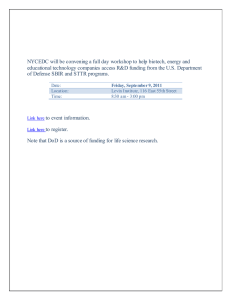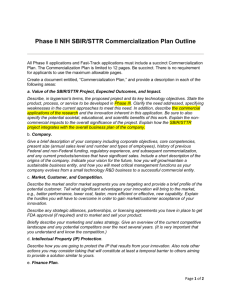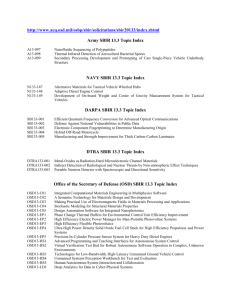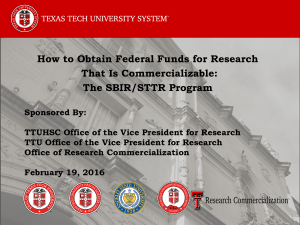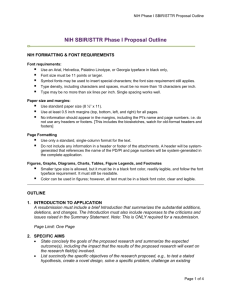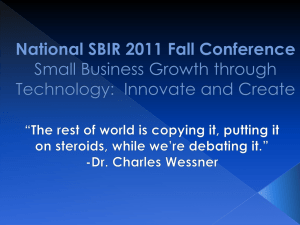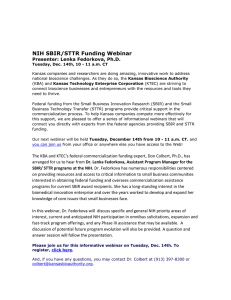2014 Overview of the NCI Small Business
advertisement
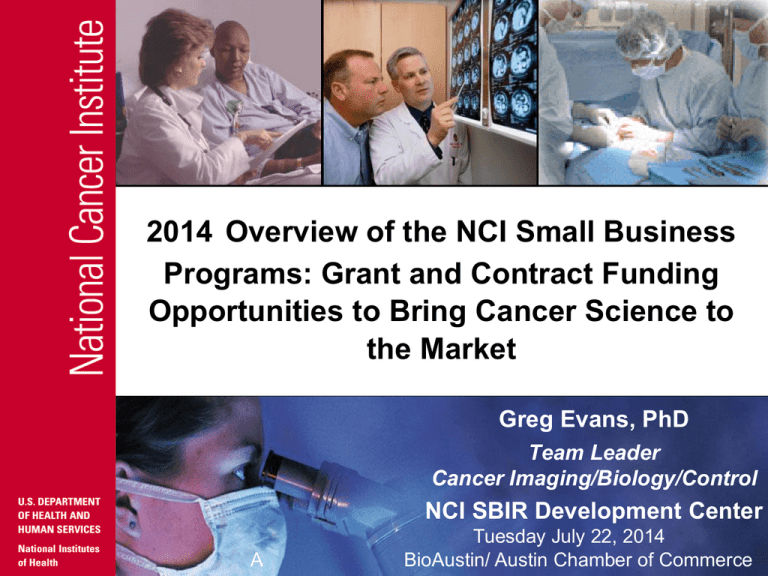
2014 Overview of the NCI Small Business Programs: Grant and Contract Funding Opportunities to Bring Cancer Science to the Market Greg Evans, PhD Team Leader Cancer Imaging/Biology/Control NCI SBIR Development Center A Tuesday July 22, 2014 BioAustin/ Austin Chamber of Commerce Today’s Presentation SBIR and NIH Background Information Company-Initiated SBIR/STTR Grant Applications- 3 DEADLINES PER YEAR Targeted NCI SBIR Funding Opportunities • New Contract Topics Published Once Per Year in August- DEADLINE IN NOVEMBER • 3 Narrowly-Focused Grant Program Announcements Ending 2014-2016 SBIR Phase IIB Bridge Grant Program- 3rd Stage and Largest Award • Requirement for Matching Funds Initiatives (Beyond Funding) to Facilitate Commercialization Tips for a Successful NCI SBIR Application NCI SBIR Development Center 2 Congressional Goals 1. Stimulate technological innovation 2. Use small business to meet Federal R&D needs 3. Increase private-sector commercialization innovations derived from Federal R&D 4. Foster participation by minority and disadvantaged persons in technological innovation Small Business Innovation Development Act of 1982 Small Business Technology Transfer Act of 1992 3 Congressionally-Mandated Programs Small Business Innovation Research (SBIR) Set-aside program for small business concerns to engage in Federal R&D with the potential for commercialization Federal agencies with an extramural R&D budget > $100M Set Aside $$ FY14 FY17 2.8% 3.2% 0.40% 0.45% Small Business Technology Transfer (STTR) Set-aside program to facilitate cooperative R&D between small business concerns and U.S. research institutions with the potential for commercialization Federal agencies with an extramural R&D budget > $1B ~$757 M in FY14 at NIH ~$119 M in FY14 at NCI 4 Increase in Set-Aside and in NCI SBIR/STTR Budget (2013 estimate) FY SBIR Setaside STTR Setaside Estimated Combined NCI Budget (Millions)* 2011 2.5% 0.30% $110 2012 2.6% 0.35% $115 2013 (just ended) 2.7% 0.35% $120 2014 2.8% 0.40% $125 2015 2.9% 0.40% $130 2016 3.0% 0.45% $135 2017 3.2% 0.45% $140 * Assumes flat NIH overall budget 5 NIH = 27 Institutes & Centers 24 Participate in the SBIR/STTR Program Office of Research Infrastructure Programs (ORIP) The Office of the Director (OD) (NIA) National Institute on Alcohol Abuse & Alcoholism (NIAAA) National Institute of Allergy & Infectious Diseases (NIAID) National Institute on Deafness & Other Communication Disorders (NIDCD) National Institute of Dental and Craniofacial Research (NIDCR) National Institute of Diabetes & Digestive & Kidney Diseases (NIDDK) National Institute on Drug Abuse National Institute of General Medical Sciences (NIGMS) National Heart, Lung, & Blood Institute (NHLBI) National Human Genome Research Institute (NHGRI) National Institute of Mental Health National Center for Complementary & Alternative Medicine (NCCAM) Fogarty International Center (FIC) National Institute on Aging National Institute on Minority Health & Health Disparities (NIMHD) NIH Clinical Center (CC) National Institute of Arthritis & Musculoskeletal & Skin Diseases (NIAMS) (NIDA) (NIMH) National Center for Advancing Translational Sciences (NCATS) Center for Information Technology (CIT) National Cancer Institute (NCI) National Institute of Child Health & Human Development (NICHD) National Institute of Environmental Health Sciences (NIEHS) National Eye Institute National Institute of Neurological Disorders & Stroke (NINDS) National Institute of Nursing Research National Library of Medicine (NLM) Center for Scientific Review (CSR) (NEI) (NINR) National Institute of Biomedical Imaging & Bioengineering (NIBIB) No funding authority 6 FY2013 SBIR/STTR Funding Levels Agency/Institute SBIR STTR SBIR+STTR NIH $620M $80M $717M NCI $97M $13M $110M ← The annual SBIR/STTR budget for each participating Institute or Center (IC) is proportional to the total annual budget appropriation for that IC NIGMS NIDDK 7 NCI SBIR/STTR Active Portfolio: Pipeline of 400+ Vetted Projects Health IT & Software Tools 12% Tools for Basic Research 7% Therapeutics 33% In Vitro Diagnostics 21% Imaging 20% Devices for Cancer Therapy 7% 8 Reasons to Seek SBIR/STTR Funding • Provides seed funding for innovative technology development • Provides recognition, verification and visibility • Helps provide leverage in attracting additional funding or support (e.g., venture capital, strategic partner) Not a Loan No repayment is required Doesn’t impact stock or shares in any way (i.e., non-dilutive) • Intellectual property rights retained by the small business 9 SBIR Eligibility Requirements • Applicant is a Small Business Concern (SBC) • Organized for-profit U.S. business • 500 or fewer employees, including affiliates • PI’s primary employment (>50%) must be with the SBC at time of award & for duration of project • > 50% U.S.- owned by individuals and independently operated* OR • > 50% owned and controlled by other business concern/s that is/are > 50% owned and controlled by one or more individuals* OR • > 50% owned by multiple venture capital operating companies, hedge funds, private equity firms, or any combination of these * *Formerly >= 51%; *New rule starting 1/28/13, NIH SBIR only 10 STTR Eligibility Applicant is a Small Business Concern Formal Cooperative R&D Effort • 40% by small business • 30% by U.S. research institution U.S. Research Institution: College or University; Non-profit research organization; Federally-Funded R&D Center (FFRDC) Intellectual Property Agreement • Allocation of IP rights (to SBC) and rights to carry out follow-on R&D and commercialization Principal Investigator’s primary employment may be with either the Small Business Concern or the research institution 11 SBIR and STTR Programs (Critical Differences) SBIR STTR • Permits research institution partners (e.g., universities) • Small business concern may outsource ~33% of Phase I activities and 50% of Phase II activities • Requires research institution partners (e.g., universities) • Minimum 40% of the work should be conducted by the small business concern (for profit), and minimum of 30% by a U.S. research institution (non-profit) Award always made to small business 12 NCI Has Multiple Small Business Solicitations Know the Application Deadlines SBIR & STTR Omnibus Solicitations for Grant Applications Release: January Receipt Dates: April 5, August 5, and December 5 Solicitation of the NIH & CDC for SBIR Contract Proposals Release: typically early August Receipt Date: only once per year, typically early November See the NIH Guide for other Program Announcements (PA’s) and Requests for Application (RFA’s), i.e. grants Release: Weekly Receipt Dates: Various http://grants.nih.gov/grants/guide 13 NCI SBIR/STTR Budget Distribution Administrative Supplements NIH Technical Assistance Programs Contracts Grants 14 NCI Offers Three SBIR/STTR Award Stages PHASE I – R41, R43 Grant, or Contract • Feasibility Study • $300K over < 12 months (rarely 18-24 months PHASE II – R42, R44 Grant, or Contract • Full Research/R&D • $2.0M over 2-3 years • Commercialization plan required Phase IIB Bridge Award PHASE III • Commercialization Stage $1M per year for 3 years, with matching $$ (also NHLBI, NINDS) • Use of non-SBIR/STTR Funds 15 New Provisions in Current Omnibus Grant Solicitations, Enacted in Last 2 Years • SBIR/STTR applicants must register at the SBA Company registry at SBIR.gov. • VC-backed companies (VCOC, hedge fund, private equity firms) CAN NOW apply (NIH SBIR only). • Applicants can request $5000 in Technical Assistance, beyond award cap. If requested, cannot participate in NIH Technical Assistance Programs. 16 Newest Provisions Implemented • FY15 allows switching between STTR and SBIR mechanisms • Applicants may apply for Phase II SBIR funding based on Phase I STTR award or vice versa. • Direct to Phase II applications for SBIR 17 SBIR/STTR Success Rates NIH-Wide Number of Number of Success Applications Applications Rate Reviewed Awarded Fiscal Year SBIR/STTR Phase 2013 SBIR Fast Track 313 49 15.7% $13,981,386 2013 SBIR Phase I 3,738 495 13.2% $114,040,157 2013 SBIR Phase II 542 178 32.8% $136,348,846 2013 STTR Fast Track 42 12 28.6% $2,542,128 2013 STTR Phase I 583 109 18.7% $24,138,629 2013 STTR Phase II 72 19 26.4% $10,985,373 2013 FY TOTAL 5,290 862 16.3% $302,036,519 Total Funding Success rates are defined as the percentage of reviewed grant applications that receive funding. 18 SBIR/STTR Success Rates – NCI 2013 NCI Program Number of Number of Success Applications Applications Rate Reviewed Awarded Total Funding STTR Ph I 110 18 16.4% $4,460,889 STTR Ph II 8 1 12.5% $250,569 SBIR Ph I 548 52 9.5% $11,959,712 SBIR Ph II 128 24 18.8% $15,294,335 Success rates are defined as the percentage of reviewed grant applications that receive funding. 19 NIH Timeline for New Grant Applications 7-10 months Due Date Scientific Review Council Review Award Date (earliest) April 5 August 5 December 5 July October March October January May December April July 20 NCI Has Multiple Small Business Solicitations Know the Application Deadlines SBIR & STTR Omnibus Solicitations for Grant Applications Release: January Receipt Dates: April 5, August 5, and December 5 Solicitation of the NIH & CDC for SBIR Contract Proposals Release: typically early August Receipt Date: only once per year, typically early November See the NIH Guide for other Program Announcements (PA’s) and Requests for Application (RFA’s), i.e. grants Release: Weekly Receipt Dates: Various http://grants.nih.gov/grants/guide 21 Annual Solicitation for NCI SBIR Contract Topics Areas of interest to the commercial sector, based on market opportunity NCI scientific & technology priorities Contract topics in NCI priority areas with strong potential for commercial success $37,406 $25,020 13% 2007 25% $7,757 13% 17% 8% 2008 2009 NCI SBIR contracts (thousands) $26,102 $16,665 $12,387 $38,174 24% 17% 33% 35% 25% 2012 2013 % of total NCI SBIR 8% 2010 2011 Fiscal Year 22 NCI SBIR Contracts vs. Grants: What's the difference? SBIR Grants SBIR Contracts Scope of the proposal Investigator-defined within the mission of NIH Defined by the NIH (focused) Questions during solicitation period? May speak with any Program Officer MUST contact the contracting officer Receipt Dates 3 times/year for Omnibus Only ONCE per year Peer Review Locus NIH Center for Scientific Review (CSR) NCI Division of Extramural Activities Basis for Award Peer review score/ Program assessment Peer review score/negotiation of technical deliverables, budget Reporting One final report (Phase I); Annual reports (Phase II) Kickoff presentation, quarterly progress reports, final report, commercialization plan Set-aside funds for particular areas? No Yes Program Staff Involvement Low High 23 2013 NCI Contract Topics- last year http://sbir.cancer.gov/funding/contracts Therapy & Diagnosis • • • • 326 Development of Novel Therapeutic Agents that Target Cancer Stem Cells 327 Reformulation of Failed Chemotherapeutic Drugs 331 Development of a Biosensor-Based Core Needle Tumor Biopsy Device 332 Development of Radiation Modulators for Use During Radiotherapy Advancing Cancer Research • 328 Validation of 3D Human Tissue Culture Systems that Mimic the Tumor Microenvironment • 329 Proteomic Analysis of Single Cells Isolated from Solid Tumors • 330 Generation of Site-Specific Phopho-Threonine Protein Standards for Use in Cancer Assays Health IT • 333 Software Tools for the Development of Environmental Measures Related to Cancer Health Behavior and Resources 24 NCI Has Multiple Small Business Solicitations Know the Application Deadlines SBIR & STTR Omnibus Solicitations for Grant Applications Release: January Receipt Dates: April 5, August 5, and December 5 Solicitation of the NIH & CDC for SBIR Contract Proposals Release: typically early August Receipt Date: only once per year, typically early November See the NIH Guide for other Program Announcements (PA’s) and Requests for Application (RFA’s), i.e. grants Release: Weekly Receipt Dates: Various http://grants.nih.gov/grants/guide 25 Development of Highly Innovative Tools and Technology for Analysis of Single Cells (PA-13-140) Goal: Development of next-generation tools to better define cell heterogeneity in situ, with substantially increased sensitivity, selectivity, spatiotemporal resolution, scalability or non-destructive analysis of multiple global or functional measures of single cells. • Affiliated with the Single Cell Analysis Program (SCAP) through the NIH Common Fund • New analytical measures and manipulations of cellular contents, structure and activity beyond those currently available • First-in-class and/or cross-cutting techniques Next receipt dates: Aug 5, Dec 5 through 2015 Contact Dr. Xing-Jian Lou: loux@mail.nih.gov http://commonfund.nih.gov/Singlecell/ 26 Innovative Molecular Analysis Technology Development for Cancer Research and Clinical Care (SBIR-IMAT, PAR-13-327) Goal: To support the development, maturation, and dissemination of novel and potentially transformative next-generation technologies through an approach of balanced but targeted innovation in support of clinical, laboratory, or epidemiological research on cancer. • Molecular and cellular analytical technologies for cancer detection and/or characterization in vitro, in situ, or in vivo Next receipt dates: November and May through 2016 Contact Dr. Amir Rahbar: rahbaram@mail.nih.gov http://sbir.cancer.gov/funding/technology 27 Innovative Health IT for Broad Adoption by Healthcare Systems & Consumers (PA-12-196) Goal: Accelerate development & commercialization of evidence-based consumer health IT to: • Prevent or reduce the risk of cancer • Facilitate patient-provider communication • Improve disease outcomes in consumer & clinical settings • Phase II or Fast-Track applications only • Strong applicants will have a partnership with large business (e.g. commercial IT firm, EMR vendor, healthcare systems, etc.) Next receipt dates: August 5, December 5 through 2014 Contact Dr. Patricia Weber: weberpa@mail.nih.gov http://sbir.cancer.gov/resource/hit/ 28 NCI Offers Three Award Stages PHASE I – R41, R43 Grant, or Contract • Feasibility Study • $225K over 9-12 months (rarely 24) PHASE II – R42, R44 Grant, or Contract • Full Research/R&D • $1.5M over 2-3 years • Commercialization plan required Phase IIB Bridge Award PHASE III • Commercialization Stage $1M per year for 3 years, with matching $$ (also NHLBI, NINDS) • Use of non-SBIR/STTR Funds 29 Strategy Competing Renewal Program for SBIR Phase II Awards • Provides additional NIH funding to extend selected projects • Involves another peer-review cycle to evaluate progress & future plans • Accelerates commercialization by incentivizing partnerships with third-party investors & strategic partners earlier in the development process How does NCI accomplish this goal? • NCI gives competitive preference and funding priority to applicants that can raise substantial third-party funds (i.e., ≥ 1:1 match) “…Applicants are expected to leverage their previous NIH SBIR support, as well as the opportunity to compete for additional NCI funding under this [funding announcement], to negotiate and attract third-party financing needed to advance a product or technology toward commercialization…” 30 Important Features of Phase IIB Bridge Award • Eligibility • Current Phase II awards & and those that ended within the last 2 years • Cancer-related Phase II projects initially funded by other NIH institutes • Ad Hoc Peer Review Committee to Evaluate Technical and Commercial Merits • Reviewers are academics, clinicians, industry professionals, venture capitalists • Emphasizes important commercialization considerations such as intellectual property (e.g., patents) and strategy for gaining FDA approval • Requires complete disclosure of applicant’s SBIR commercialization history Third-Party Fundraising plan • Preferred Types of Funds: Cash, liquid assets, convertible debt • Sources of Funds: Another company, venture capital firm, individual “angel” investor, foundation, university, state or local government, or any combination 31 16 NCI Phase IIB Bridge Awards (to date) $20,000,000 $15,000,000 $10,000,000 $5,000,000 $0 NCI Total $37,160,051 Third-Party Investments $82,502,379 Leverage > 2 to 1 Venture Capital: Strategic Partners: Individuals & Other: 1/3 1/3 1/3 32 NCI SBIR Investor Forums- 2009, 2010, 2012, and 2014 33 Know NIH SBIR/STTR Grant Review Criteria Significance • Does the product address an important problem, and have commercial potential? Is there a market pull for the proposed product? Approach • Are design and methods well-developed and appropriate? Are problem areas addressed? Innovation • How novel is the product and the approaches proposed to test its feasibility? Investigator • Is the investigator appropriately trained and capable of managing the project? Environment • Does the scientific environment contribute to the probability of success? Is the environment unique? Commercialization • Is the company’s business strategy one that has a high potential for success? 34 Other Tips for a Strong Application • Significant, innovative, and focused science • Make the SBIR/STTR application product-focused, as distinct from an R01 • Generate preliminary data, if possible • Enlist appropriate collaborators (e.g., cancer biologists, clinicians, statisticians), and include letters of support • Explain the key issues and controversies in the product space; describe the competition and your value proposition • Identify any unanswered questions, and then contact NCI SBIR program staff for help • Write clearly • Prepare your application early! 35 NCI SBIR Development Center Staff Michael Weingarten, MA Director NCI SBIR Development Center Greg Evans, PhD Lead Program Director Cancer Imaging, Cancer Biology, Cancer Research Tools, E-Health, Epidemiology Andrew J. Kurtz, PhD Lead Program Director Biologics, Small Molecules, Nanotherapeutics, Molecular Diagnostics, Bridge Award Patricia Weber, DrPH Program Director Digital Health, Therapeutics, Biologics, SBIR Investor Forum, FRAC Workshop Jian Lou, PhD Program Director In-Vitro Diagnostics, Theranostics, early-stage drug development , Bioinformatics, FRAC Workshop Deepa Narayanan, MS Program Director Cancer Imaging, Clinical Trials, Radiation Therapy, SBIR Investor Forum, FRAC Workshop Ming Zhao, PhD Program Director Cancer Diagnostics & Therapeutics, Cancer Control & Prevention, Molecular Imaging, Bioinformatics, Stem Cells Christie Canaria, PhD AAAS Science & Technology Policy Fellow Policy, Outreach, Success Stories, Scientific Communications, SBIR Investor Forum, FRAC Workshop Todd Haim, PhD Program Director Small Molecules, Biologics, Immunotherapeutics, Theranostics, SBIR Investor Forum, FRAC Workshop Amir Rahbar, PhD, MBA Program Director In-Vitro Diagnostics, Biologics, Therapeutics, Proteomics, SBIR Investor Forum Jennifer Shieh, PhD Program Director Digital Health, Bioinformatics, Research Tools, Evaluation, SBIR Investor Forum, FRAC Workshop 36 Managing NCI’s SBIR/STTR Portfolio Old Management Model • Awards were managed by 40-50 program staff from across the NCI who each spent a small percentage of their time on SBIR • Program directors had significant technical expertise but typically had no industry experience or commercialization expertise New SBIR Development Center Goal: Enhance commercialization success of SBIR-funded projects • 10-member management team exclusively focused on the administration of NCI’s SBIR/STTR portfolio • Center staffed by program directors with industry experience and a broad range of technical expertise • Center collaborates with staff from across other NCI divisions to integrate the small business initiatives with the Institute’s priorities • Center is developing a range of new initiatives to help small businesses 37 NCI SBIR Outreach Travel in Calendar 2012 San Diego, CA $3.0M for the commercialization of ASONEP™, a firstin-class monoclonal antibody against the angiogenic growth factor S1P Oriental, NC $3.0M for the development of a photoacoustic computed tomography (CT) scanner for preclinical molecular imaging Norcross, GA $2.5M for the development of LightTouch®, a point-ofcare device for cervical cancer screening Northridge, CA $3.0M for the development of a novel molecular breast imaging technique to guide early-stage patient care Miramar, FL $3.0M for the development of ALT-801, a fusion protein consisting of IL-2 coupled with a soluble T-cell receptor fragment that recognizes a specific form of processed p53 antigen West Henrietta, NY $3.0M for the development of a cone beam breast CT scanner 38 National and Regional Conferences Attended by NCI SBIR in Calendar 2012 • NIH SBIR Conference • Radiological Society of North America (RSNA) • Society of Nuclear Medicine (SNMA) • American Association of Cancer Research (AACR) • Personalized Medicine World Conference • Mobile Health Summit • Partnering for Cures • Biotechnology Industry Organization (BIO) • Mid-Atlantic BIO • JP Morgan Biotech Investment Conference 39 More Information on NCI SBIR & STTR Website Connect with us on LinkedIn Follow us on Twitter: @NCIsbir http://sbir.cancer.gov 40 http://sbir.cancer.gov Greg Evans, Ph.D. Team Leader, Cancer Imaging/Biology/Control NCI SBIR Development Center Phone: 240-276-5245 evansgl@mail.nih.gov 41
